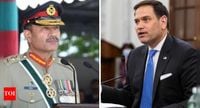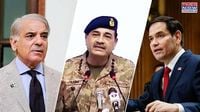NEW DELHI: In a critical diplomatic intervention, US Secretary of State Marco Rubio reached out to Pakistani Army Chief Asim Munir on Saturday, May 10, 2025, urging him to de-escalate rising tensions between India and Pakistan. This call comes amid a backdrop of escalating hostilities, including cross-border attacks and military responses from both nations.
According to a statement released by the US Department of State, Rubio emphasized the need for both parties to explore avenues for de-escalation and offered US assistance in facilitating constructive dialogue to prevent future conflicts. "Secretary of State Marco Rubio spoke with Pakistani Army Chief Asim Munir earlier today. He continued to urge both parties to find ways to de-escalate and offered US assistance in starting constructive talks in order to avoid future conflicts," the statement read.
This diplomatic outreach follows a series of provocations from Pakistan, which has reportedly intensified its military activities against India. In retaliation, the Indian armed forces targeted at least four Pakistani air bases, including Nur Khan Air Base in Rawalpindi, Murid Air Base in Chakwal, and Rafiqui Air Base in Jhang district of eastern Punjab province. India also destroyed key Pakistani posts and terrorist launch pads near Jammu, which were alleged to be used for launching drone attacks.
On May 9, Pakistan launched a significant drone offensive, targeting 26 locations across India, from Jammu and Kashmir to Gujarat. Indian defense forces successfully thwarted these attacks, which aimed at critical infrastructure such as airports and military installations. For a second consecutive night, Indian defense systems intercepted and neutralized drones and missiles attempting to strike military targets in 15 northern and western Indian cities.
The recent military actions are part of a broader Indian military response known as Operation Sindoor, which commenced on May 7, 2025. Under this operation, Indian forces conducted precise missile strikes on nine terror targets located in Pakistan-occupied Kashmir (PoK) and within Pakistan itself. This operation was launched in direct retaliation for the Pahalgam terror attack on April 22, 2025, which resulted in the tragic deaths of 26 civilians.
In a notable diplomatic maneuver, Rubio bypassed Pakistan's Foreign Minister Ishaq Dar, directly contacting Army Chief Munir, who is perceived as the key figure in Pakistan's security and foreign policy decisions. This direct line of communication underscores the urgency of the situation and the US's intent to influence Pakistan's military strategies.
Earlier, on May 8, Rubio had also engaged with India's External Affairs Minister S. Jaishankar, expressing condolences for the Pahalgam attack while reiterating the need for de-escalation. The US State Department remarked, "Secretary Marco Rubio spoke today with Indian External Affairs Minister Subrahmanyam Jaishankar. The Secretary emphasized the need for immediate de-escalation. He expressed U.S. support for direct dialogue between India and Pakistan and encouraged continued efforts to improve communications."
Rubio's calls to both leaders reflect a growing concern within the international community regarding the potential for conflict escalation in the region. His discussions with Munir and Jaishankar aim to foster a more stable environment, emphasizing the importance of dialogue over military confrontation.
Despite these diplomatic efforts, tensions remain high. Pakistan's military activities, including the drone strikes, have provoked a fierce response from India, which views these actions as direct threats to its national security. The situation is further complicated by the historical animosities and territorial disputes that have long characterized India-Pakistan relations.
As the situation evolves, the US's role as a mediator may become increasingly pivotal. Rubio's approach signals a strategic effort to engage both nations in a dialogue that could lead to a reduction in hostilities and a more peaceful resolution to their longstanding disputes.
The international community is watching closely as both India and Pakistan navigate this precarious moment. The potential for further military escalation remains a concern, with both sides demonstrating their willingness to engage in military action if provoked.
In conclusion, the diplomatic efforts led by Secretary Rubio represent a crucial step in addressing the rising tensions between India and Pakistan. As both nations grapple with the consequences of their military actions, the hope remains that constructive dialogue can pave the way for a more peaceful future.





